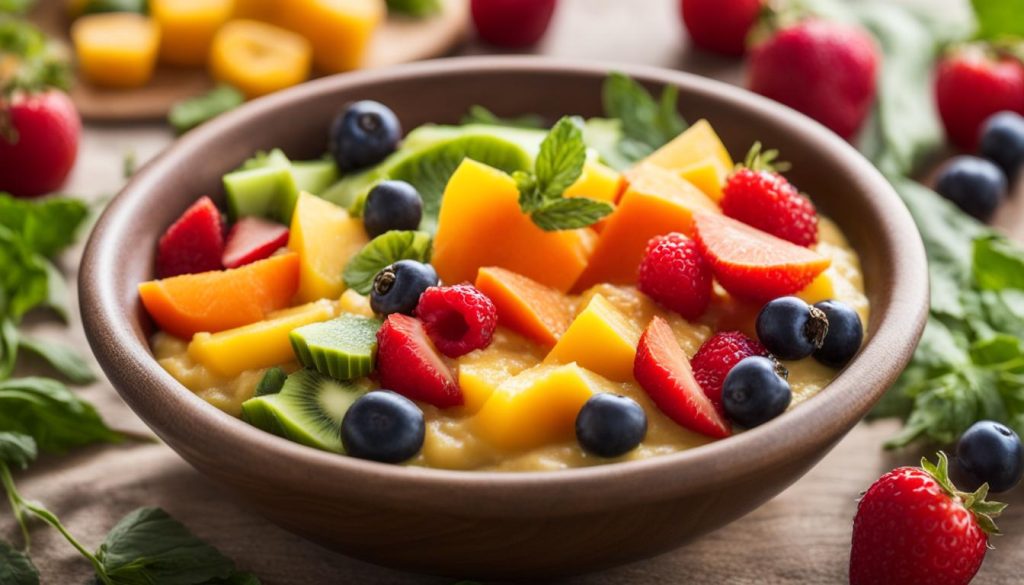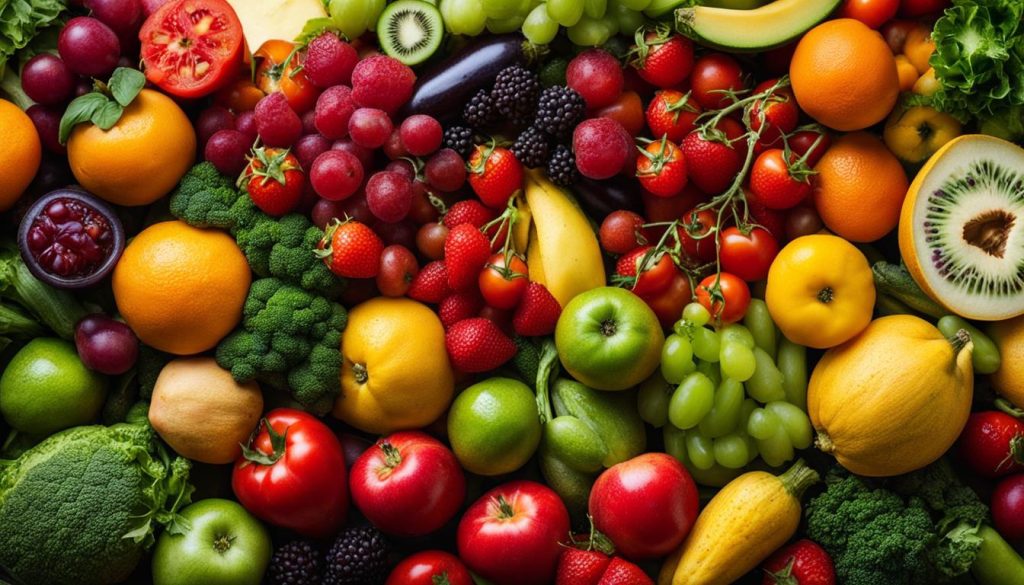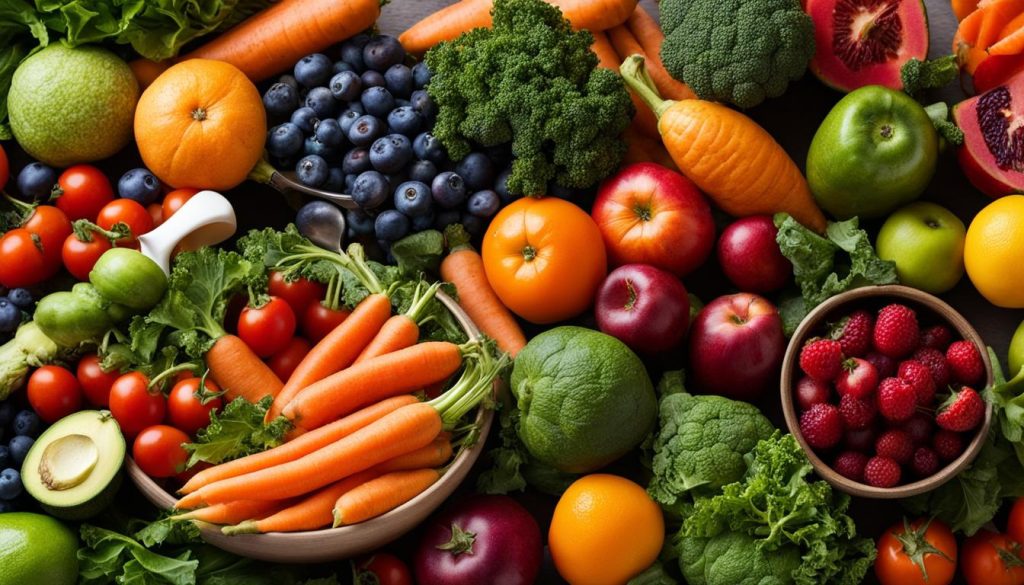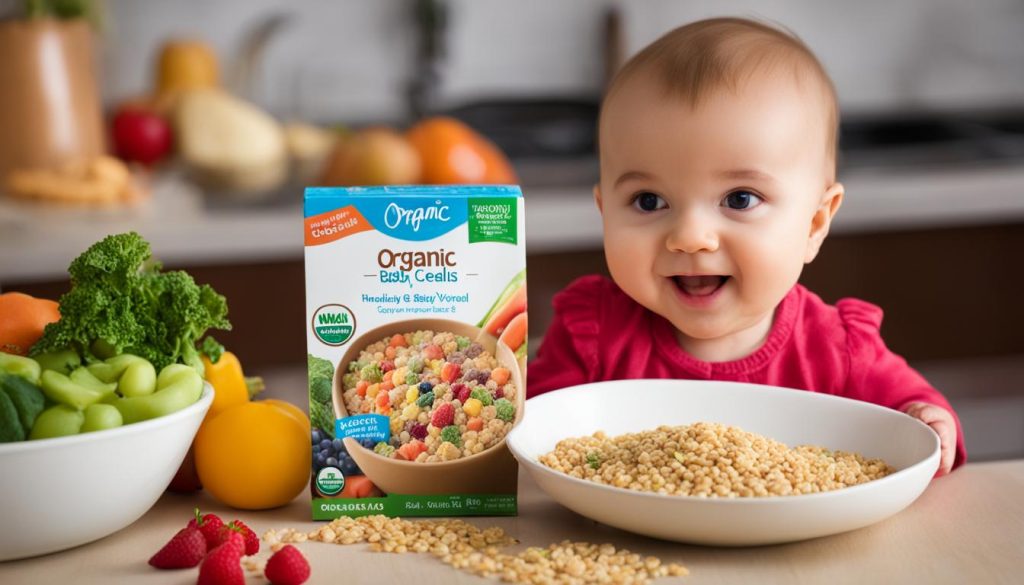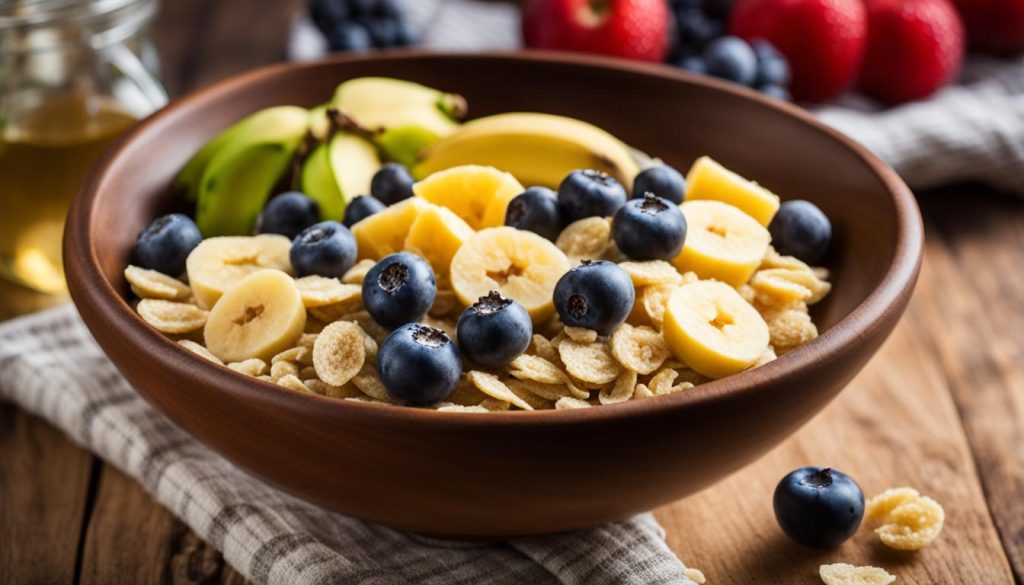As a parent, I want the best for my baby, especially when it comes to their nutrition. That’s why I’m a firm believer in the benefits of organic baby food. Choosing organic options ensures that my child receives pure and healthy nutrition, free from harmful chemicals, pesticides, and synthetic substances.
Organic baby food offers numerous advantages for infants. By opting for organic options, I can provide my baby with high-quality ingredients, essential nutrients, and minimal exposure to harmful substances. Furthermore, organic baby food promotes environmental sustainability by supporting biodiversity and preserving natural resources.
When it comes to my baby’s health, I believe that starting with a solid nutritional foundation is crucial. Organic baby food is carefully crafted to retain the highest levels of essential vitamins and minerals, such as vitamins A, C, and D, calcium, and iron. It is also free from artificial additives, preservatives, and GMOs.
Not only does organic baby food provide optimal nutrition, but it also reduces the risk of pesticide exposure. Conventionally grown foods often contain traces of pesticides, which can be particularly harmful to infants with developing immune systems. By choosing organic baby food, I can minimize pesticide exposure and protect my baby’s delicate system.
When selecting organic baby food, it’s important to read labels carefully and understand the ingredients used. Look for certifications such as USDA Organic to ensure adherence to strict organic standards. Opting for trusted brands with positive customer reviews is also essential in making informed decisions about the quality of organic baby food.
While there are many excellent organic baby food options available in stores, I also enjoy the joy of preparing homemade organic baby food. By using fresh and organic ingredients, I can have full control over the quality and nutrition of the meals I provide for my little one. It’s a rewarding experience that allows me to cater to my baby’s changing nutritional needs with nutritious and delicious meals made with love.
Introducing organic baby food into my baby’s diet has been an important step in promoting a diverse and balanced diet. Starting with single-ingredient organic baby food and gradually expanding the variety of fruits, vegetables, grains, and proteins has helped my baby develop a taste for nutritious foods. It has also encouraged self-feeding and fine motor skill development through the introduction of soft finger foods.
When it comes to feeding my baby, I also consider the choice of baby bottles. Glass baby bottles have become my preferred option due to their safety and sustainability. They are free from potentially harmful chemicals, easy to clean and sterilize, and can be reused and recycled, reducing my environmental impact.
In conclusion, choosing organic baby food has proven to be a beneficial decision for my baby’s health and well-being. It ensures pure and healthy nutrition, reduces pesticide exposure, and promotes a diverse and balanced diet. Pairing organic baby food with glass baby bottles adds an extra layer of safety and sustainability. With all these advantages, it’s no wonder why organic baby food is my top choice for my little one.
The Nutritional Value of Organic Baby Food
Organic baby food offers more than just a clean and sustainable option for feeding your little one—it also provides a higher nutritional value compared to conventionally produced baby food. With a focus on organic ingredients and minimal processing, organic baby food ensures that your baby receives the essential vitamins and minerals necessary for healthy growth and development.
One of the key advantages of organic baby food is its rich content of essential nutrients. Organic baby food is packed with vitamins A, C, and D, which support a strong immune system and promote overall health. Additionally, organic baby food often contains higher levels of calcium and iron, crucial for bone development and oxygen transportation in the body.
Studies have shown that organic produce tends to have higher nutrient content compared to conventionally grown counterparts. This is because organic farming practices prioritize soil health, which in turn leads to more nutrient-dense fruits, vegetables, and grains. By choosing organic baby food, you can ensure that your baby is getting the most out of their meals, supporting their optimal nutrition and well-being.
| Nutrient | Benefits |
|---|---|
| Vitamins A, C, and D | Supports a strong immune system and overall health |
| Calcium | Promotes healthy bone development |
| Iron | Aids in oxygen transportation in the body |
Furthermore, organic baby food is free from artificial additives, preservatives, and genetically modified organisms (GMOs). This means that every spoonful of organic baby food is pure and wholesome, without any unnecessary or potentially harmful ingredients. By providing your baby with organic baby food, you are not only supporting their nutritional needs but also giving them a clean and safe start to their lifelong relationship with food.
“Organic baby food ensures that your baby receives the essential vitamins and minerals necessary for healthy growth and development.”
In summary, organic baby food is not only a healthier and more sustainable choice, but it also offers a higher nutritional value compared to conventional baby food. Packed with essential vitamins and minerals, organic baby food supports your baby’s growth, development, and overall health. By choosing organic, you can provide your little one with the best possible start in life.
Reduced Exposure to Pesticides with Organic Baby Food
Choosing organic baby food offers numerous benefits, including a significant reduction in pesticide exposure for your little one. Conventionally grown fruits, vegetables, and grains often contain traces of pesticides, which can have adverse effects on infants with developing immune systems. Organic baby food, on the other hand, is made using organic ingredients that are grown without the use of synthetic pesticides, prioritizing natural pest control methods.
By opting for organic baby food, you are providing your baby with a safer alternative that is free from potentially harmful chemical residues. This reduced exposure to pesticides helps protect your baby’s delicate system and promotes long-term health. It gives you peace of mind knowing that you are feeding your child food that is pure, healthy, and free from harmful substances.
Organic baby food is not only beneficial for your little one’s well-being but also for the environment. Organic farming practices promote biodiversity and preserve natural resources, making it a sustainable choice. By choosing organic baby food, you are supporting a healthier planet for future generations.
The Benefits of Choosing Organic Baby Food
- Reduces the risk of pesticide-related health issues
- Provides pure and healthy nutrition for your baby
- Promotes long-term health and development
- Sustainable choice that supports the environment
“I feel confident feeding my baby organic food because I know that it is pesticide-free and made from high-quality ingredients.” – Sarah, a parent
When it comes to your baby’s health, choosing organic baby food is a wise decision. It not only reduces your baby’s exposure to pesticides but also ensures that they receive pure and healthy nutrition. By making this choice, you are prioritizing your baby’s well-being and giving them a solid foundation for a healthy future.
Considerations When Choosing Organic Baby Food
When it comes to selecting organic baby food, there are a few important considerations to keep in mind. By reading labels on organic baby food products, you can gain valuable insights into the ingredients used and make informed decisions about the food you are feeding your baby. Look for clear and transparent labeling, including information on the specific organic certifications that the product holds. Understanding these organic certifications is essential to ensure that the baby food meets the highest standards of quality and purity.
Opting for trusted organic baby food brands is another vital consideration. Research and choose brands that have a strong reputation for producing high-quality organic products. Look for brands that prioritize the use of organic ingredients and have positive customer reviews. By selecting trusted brands, you can have confidence in the quality and safety of the organic baby food you choose for your little one.
In making informed decisions about organic baby food, it’s essential to consider your baby’s unique needs and preferences. Some babies may have specific dietary requirements or allergies that need to be taken into account. Understanding these factors will help you select organic baby food options that align with your baby’s nutritional needs and ensure a safe and enjoyable feeding experience.
By reading labels, understanding certifications, opting for trusted brands, and considering your baby’s unique needs, you can make confident and informed decisions when it comes to choosing organic baby food. Providing your baby with the purest and healthiest nourishment sets the foundation for lifelong well-being and a love for wholesome eating.
The Joy of Homemade Organic Baby Food
Preparing homemade organic baby food allows me to have full control over the ingredients and ensure the utmost quality and freshness. I prioritize using fresh and organic ingredients, such as fruits, vegetables, grains, and meats, to provide my little one with the best nutrition possible. By making homemade organic baby food, I can cater to my baby’s changing nutritional needs and introduce them to a variety of flavors.
When selecting organic ingredients for homemade baby food, it’s important to choose produce that is certified organic. This ensures that the ingredients are grown without synthetic pesticides or harmful chemicals. I pay close attention to labels and look for trusted brands that prioritize organic farming practices. By selecting organic ingredients, I can provide my baby with pure, wholesome meals that are free from potentially harmful substances.
I follow safe preparation methods to ensure the homemade organic baby food is safe and hygienic. This includes thorough cleaning of fruits, vegetables, and cooking utensils, as well as proper storage and reheating techniques. I steam or boil ingredients to retain their nutrients, then blend or mash them to create a smooth texture that is suitable for my baby’s stage of development. By following these practices, I can confidently offer homemade organic baby food that is both nutritious and safe.
The Benefits of Homemade Organic Baby Food
Homemade organic baby food offers numerous benefits for both my baby and me. First and foremost, it allows me to provide my baby with customized meals that meet their individual nutritional needs. I can introduce a variety of flavors and textures, helping them develop a diverse palate and ensuring they receive a balanced diet. Homemade organic baby food also saves me money in the long run, as it is often more cost-effective than store-bought options. Plus, I have peace of mind knowing exactly what goes into each meal and can avoid unnecessary additives or preservatives.
“Preparing homemade organic baby food allows me to have full control over the ingredients and ensure the utmost quality and freshness.”
Making homemade organic baby food is a rewarding experience that allows me to bond with my baby through the preparation and feeding process. I get to witness their enjoyment and satisfaction as they explore new flavors and textures. It’s a joy to see them grow and thrive on the wholesome nutrition I provide with homemade organic baby food.
Introducing Organic Baby Food into Your Baby’s Diet
As your baby grows and develops, it is important to gradually introduce solid foods into their diet. Organic baby food provides a perfect starting point for this transition, offering a range of benefits for your little one’s health and nutrition.
When it comes to introducing organic baby food, it is recommended to start with single-ingredient purees. This allows your baby to get used to new tastes and textures while minimizing the risk of allergies. Begin with organic fruits and vegetables, such as mashed bananas or pureed sweet potatoes. Slowly expand their food variety by introducing different organic fruits, vegetables, grains, and proteins.
Providing a diverse and balanced diet is key to ensuring your baby receives all the necessary nutrients. Organic baby food offers a wide range of options, allowing you to create meals that are rich in vitamins, minerals, and essential nutrients. By incorporating organic baby food into their diet, you can promote healthy growth and development while instilling good eating habits from an early age.
The Benefits of Organic Baby Food:
- Gradual introduction of solid foods
- Expanding food variety
- Ensuring a diverse and balanced diet
Glass Baby Bottles for a Safer and Sustainable Feeding Choice
When it comes to feeding our babies, ensuring their safety and well-being is of utmost importance. That’s why many parents who choose organic baby food also opt for glass baby bottles as a safer and more sustainable choice.
Glass bottles offer several advantages when it comes to feeding our little ones. First and foremost, they are free from potentially harmful chemicals like BPA and phthalates, which can leach into the food and pose health risks. Glass bottles are non-reactive, preserving the purity and quality of organic baby food without compromising its nutritional value.
Another key benefit of glass bottles is their ease of cleaning and sterilization. Glass is naturally resistant to bacteria and odors, making it a hygienic option for our babies. Additionally, glass bottles are reusable and recyclable, meaning they not only reduce waste but also have a lower environmental impact compared to plastic alternatives.
By choosing glass bottles alongside organic baby food, parents can provide their little ones with a holistic and safe feeding experience. From the safety and purity of the bottles to the environmental benefits they offer, glass baby bottles are an excellent choice for those seeking the best for their babies and the planet.
FAQ
What are the benefits of organic baby food?
Organic baby food offers pure and healthy nutrition, free from harmful chemicals and synthetic substances. It provides high-quality ingredients, essential nutrients, and minimal exposure to harmful substances. Organic baby food is also environmentally friendly, promoting biodiversity and preserving natural resources.
What is the nutritional value of organic baby food?
Organic baby food is carefully crafted to retain high levels of essential vitamins and minerals, such as vitamins A, C, and D, calcium, and iron. Studies have shown that organic produce tends to have higher nutrient content compared to conventionally grown counterparts. It provides a solid nutritional foundation for a healthy future.
Does organic baby food reduce exposure to pesticides?
Yes, choosing organic baby food reduces exposure to pesticides. Conventionally grown foods often contain traces of pesticides, which can pose risks, especially for infants with developing immune systems. Organic baby food is made using organic ingredients grown without synthetic pesticides, offering a safer alternative.
What should I consider when choosing organic baby food?
When choosing organic baby food, it is essential to read labels carefully and understand the ingredients used. Look for certifications such as USDA Organic, which ensures adherence to strict organic standards. Opt for trusted brands with a strong track record of producing organic products and positive customer reviews.
How can I make homemade organic baby food?
To make homemade organic baby food, prioritize using fresh and organic ingredients such as fruits, vegetables, grains, and meats. Follow safe preparation methods, including thorough cleaning, steaming or boiling, blending or mashing, and proper storage and reheating. Homemade organic baby food allows you to have full control over the ingredients and ensure the utmost quality and freshness.
How do I introduce organic baby food into my baby’s diet?
Start with single-ingredient organic baby food to gently introduce new tastes. Monitor your baby’s reactions and gradually expand their food variety by introducing new fruits, vegetables, grains, and proteins. Provide a diverse selection of organic foods to expose your baby to various nutrients and encourage a balanced diet.
Are glass baby bottles a better choice for feeding with organic baby food?
Glass baby bottles are a safer and more sustainable choice for feeding with organic baby food. They are free from potentially harmful chemicals like BPA and phthalates, ensuring safety and purity. Glass bottles are non-reactive, preserving the quality and purity of organic baby food without leaching any substances. They are also easy to clean, sterilize, and are reusable and recyclable, reducing environmental impact.

